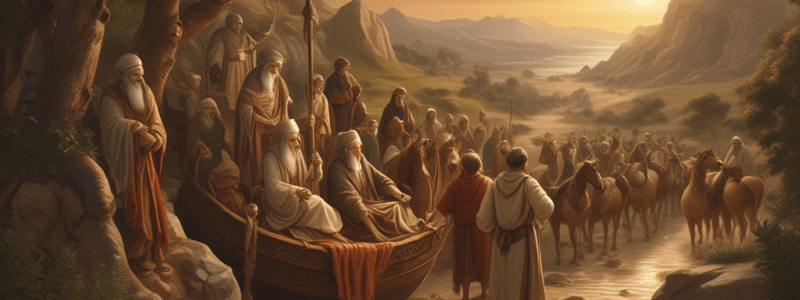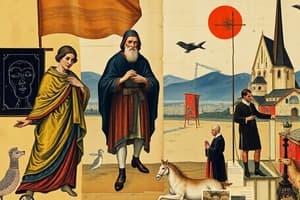Podcast
Questions and Answers
What was the purpose of Aharon throwing his stick in front of Pharaoh?
What was the purpose of Aharon throwing his stick in front of Pharaoh?
To prove Hashem's power as a sign to Pharaoh.
What is the main message of the story about Rabbi Yisrael Salanter and the cup of coffee?
What is the main message of the story about Rabbi Yisrael Salanter and the cup of coffee?
Gratitude should be extended to all aspects of life, not just the basic necessities
Who was told to bring the first three plagues?
Who was told to bring the first three plagues?
Aaron was told to bring each of the plagues
What might seem strange about who was told to bring each of the plagues?
What might seem strange about who was told to bring each of the plagues?
What reason does Rashi give for who brought on the first three plagues?
What reason does Rashi give for who brought on the first three plagues?
What happened to Aharon's stick after the Egyptian magicians duplicated the miracle?
What happened to Aharon's stick after the Egyptian magicians duplicated the miracle?
What is the lesson about הכרת הטוב (Gratitude) that can be learned from Rabba bar Mari's answer to Rava?
What is the lesson about הכרת הטוב (Gratitude) that can be learned from Rabba bar Mari's answer to Rava?
How can one express hakarat hatov (gratitude) in daily life, according to the Mekorot?
How can one express hakarat hatov (gratitude) in daily life, according to the Mekorot?
What is the significance of the phrase 'If there is a well that you drank from, do not throw a stone into it' in the context of gratitude?
What is the significance of the phrase 'If there is a well that you drank from, do not throw a stone into it' in the context of gratitude?
In what way can one develop a 'Gratitude Attitude' in life, according to Rabbi Yisrael Salanter's story?
In what way can one develop a 'Gratitude Attitude' in life, according to Rabbi Yisrael Salanter's story?
According to Ben Zoma, who is considered rich?
According to Ben Zoma, who is considered rich?
What was the pattern of Pharaoh's response to the plagues?
What was the pattern of Pharaoh's response to the plagues?
Why did Pharaoh's heart remain stubborn despite the miracles?
Why did Pharaoh's heart remain stubborn despite the miracles?
What does the concept of gratitude mean to you?
What does the concept of gratitude mean to you?
Can you think of any examples where you may have shown gratitude in your life?
Can you think of any examples where you may have shown gratitude in your life?
Flashcards are hidden until you start studying
Study Notes
The Story of the 10 Plagues
- After Hashem's encounter with Moshe at the burning bush, Moshe and his brother Aharon went to visit Pharaoh to ask him to free the Bnei Yisrael from slavery.
- Aharon threw his stick in front of Pharaoh, and it turned into a snake as proof of Hashem's power.
- Pharaoh's magicians managed to do likewise, but Aharon's stick swallowed up the Egyptians' snakes.
- Despite this, Pharaoh's heart remained stubborn, and he refused to free the Bnei Yisrael.
The 10 Plagues
- Hashem told Moshe that He would send plagues to punish the Egyptians and convince Pharaoh to free the slaves.
- During each plague, Pharaoh agreed to free the Jews, but when it ended, he changed his mind, and another plague was sent.
Exploring the Text
- In the pasukim (verses), Hashem instructs Moshe to tell Aharon to perform the first three plagues:
- The first plague: turning the waters of Egypt into blood (Exodus 7:19)
- The second plague: bringing up frogs on the land of Egypt (Exodus 7:1)
- The third plague: striking the dust of the earth to become lice throughout Egypt (Exodus 8:12)
- Rashi commentary: Aharon performed the first three plagues because the Nile River protected Moshe when he was a baby, and Hashem did not want Moshe to perform the plagues that would harm the river.
Gratitude
- The concept of gratitude (Hakarat HaTov) is discussed in the text, with a focus on appreciating the good things in life.
- According to Ben Zoma, one who is happy with their lot is considered rich (Pirkei Avot 4:1).
- Rabbi Yisrael Salanter's story about the expensive cup of coffee illustrates the importance of appreciating the entire experience, not just the physical item.
- The story highlights the blessing of Shehakol, which acknowledges the Creator's role in providing everything, including the background music, decor, and china.
Additional Ideas about Gratitude
- The video https://www.youtube.com/watch?v=ovj5dzMxzmc provides additional ideas about gratitude.
- The Gemara's question about not throwing a stone into a well that you drank from teaches us to appreciate the good things we have received from others and not to harm them (Rava and Rabba bar Mari).
- Developing a "Gratitude Attitude" can be achieved by:
- Reflecting on the blessings in our lives
- Expressing gratitude to others for the good they have done for us
- Appreciating the entire experience, not just the physical item
Studying That Suits You
Use AI to generate personalized quizzes and flashcards to suit your learning preferences.




